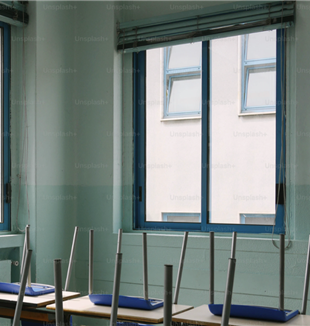
Seeking Truth Intensely
Part IV of The Religious Sense at Work Series: a witness from a high school theology teacherThe Religious Sense at Work is a weekly limited series that explores the way our communal reading of The Religious Sense informs and illuminates our experience of work.
I am a high school theology teacher, but I can easily despair attempting to educate the next generation with a clear proposal that life is full of meaning and is directed towards an ultimate destiny. In these years of teaching I have discovered that it is possible to open up the deepest questions in my students and colleagues. This happens when I am interested in what interests them and when I sincerely engage them with questions. However, it is easy to imagine this work as something I want to “introduce to the students” without paying attention to the religious sense in myself, which is actually the key to what I desire to propose.
Since we began working on The Religious Sense last summer, the first premise on realism immediately left me full of questions. What does it mean to grow in certainty and at the same time remain open to a possibility for understanding something in a more significant way? Is it even possible to both be certain about a judgment and truly enter into dialogue with others?
Last August, I began teaching at a new school with new colleagues and a new curriculum. For the first time, I was working in a school with another friend from the movement. One month into the school year, I needed some guidance in teaching an unfamiliar topic, so I attended one of Patrick’s classes to observe a few lessons for that unit. What began as initially needing some help on a particular topic led to a year of understanding education on a deeper level. Rather than attend his class for just a few lessons, I attended one of his sections for the entire school year during one of my free periods. Instead of this seemingly taking up my “free time” to get work done, it became the very hour that enabled me to work in a truer way during the rest of my time at work.
The starting point of education is a person, so rather than Patrick handing me his extremely organized and detailed curriculum binder, he invited me to “come and see” to experience his teaching firsthand. I watched and sometimes participated in what happened in his classroom as he encouraged students to dig into the content in a thoughtful way and encouraged them to judge what they learned.
During the year some lessons were incredible and led to thoughtful discussions among his students, while others fell flat. Even the lessons that bombed became an opportunity for us to ask together what was missing and what could have been different.
Patrick and I were able to make judgments about the lessons including the content proposed and the method used. We were able to talk about what led to fruitful discussions, where the students were more engaged and asked deeper questions, and when the lesson didn’t arrive all the way at the level of what we wanted to propose based on how the students responded to questions. We were living and discussing the questions we had read about during School of Community.
At the beginning of the year the students would ask me “Why are you here again?” But eventually when I was absent or could not attend, Patrick’s students inquired as to why I wasn’t there. Even though I was not their teacher, the students observed a friendship that sought to share something significant with them. They felt comfortable engaging with me as well as Patrick about their questions. Sometimes Patrick would ask me to publicly respond to students' questions, and sometimes we would correct each other about a response even in front of the students, not fearing embarrassment for needing to be corrected. In our time in the classroom together, I learned to love what is real more than my own ideas of how to teach or respond to questions. Being open to something beyond my initial impression helped me to be more sincere in my desire for truth and in my affection for my students, wanting them to receive the best possible education.
What happened in my own classroom was that I was no longer afraid to guide the students to be protagonists in their education, putting the emphasis on them to discover the significance of what was being taught. Rather than giving immediate answers to their questions, I found myself responding with questions that led them to think more critically. I found myself not afraid of attempting to challenge the common mentality that many of them hold and presenting a true Christian proposal, even if it meant going against their preconceptions.
In the first premise, Fr. Giussani says that judgment is the beginning of liberation. I think that the witness of two teachers asking each other questions at the most fundamental level – desiring to see what is real – was a meaningful step this year in sharing the experience of freedom that comes from a new way of being together – as friends seeking truth intensely.
Christine, Chicago, IL